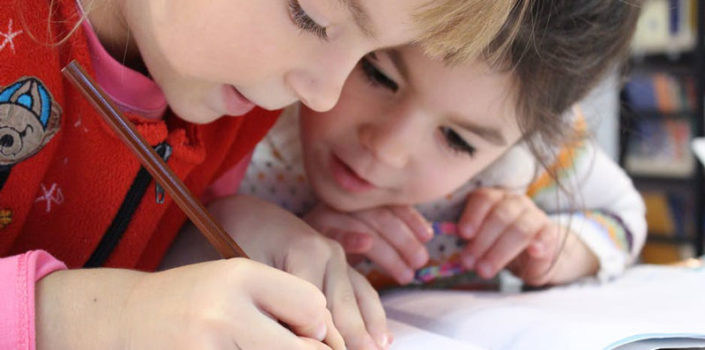Category Archives: Parenting
10 Daily Habits That Will Make Your Kids More Creative and Smarter

Scientists often pronounce that the foremost juncture of a child’s life is considered as the aperture of prospects. Brain can build up the most unbiased webbings at these crucial phases. Intelligence, creativity and smartness are considered to be innate qualities. However, some searches have refused to agree with this aforesaid statement. According to them, intelligence and smartness can be enhanced with the help of purposeful activities. The environment and the seasoned activities play a significant role in the process of nutriment.
Here’s out handpicked list of 10 Daily habits that will make your kids more creative and smarter amongst their peers.

1. Travelling Escapades
Travel is a cunning speculation that makes you bright and considerably swells your intelligent quotient. It also develops your perception of corporeality as you bask in new sights and environment. According to science, it has been certified that it enhances your probabilities of being victorious as you get exposed to diverse cultures. Travelling escapades increases aesthetic distinction and enriches your imagination. Such voyages fling off your comfort zone and make you register your strength and capability.
2. Reading of Books
The reading spree succours an individual in every aspect of his/her life. It has an amazing calmative power and can sharpen your brain muscles like no other anecdotes. It also has a colossal potential to boost your analytical skills, general knowledge, vocabulary, and writing strength. Books also help you to travel to places without being dynamic.
3. Indulgence in Outdoor Sports
Outdoor games are a multi receptive enterprise and aid the children to amplify their grey cells in eccentric ways. It also helps to subsume notions in a pragmatic manner and soothingly invigorates creativity. Time spent outside also lessens anxiety and snowballs the imagination skills. Children also tend to intensify compassion while conversing with the nature and eventually develop massive physical strength.
4. Developing A Hobby
A new set of hobbies like music, dance, painting, sports and other sorts make you smarter than ever. Hobbies make you malleable and help you to acclimatize in every division of your life. Music revamps your auricular senses and motor reflexes. Dancing on the gleeful music beats can rear your memory and towers your rational thought process. Painting prospers your aesthetic versatility while sports tweak your degree of fitness.
5. Imbibing A New Language
The advantage of multilingualism cannot be expressed in any words. Mastering more than one language ameliorates our attention level, short term memory, self-control and holistic views. It also helps to rediscover yourself and demonstrate a nascent identity. Multilingual speakers are also better at shunning off inapt information, designating tasks and are also able to balance multitude of works with élan.
6. Breaking Off the Shackles of The Comfort Zone
The shackles of comfort zone engulf you in a world of claustrophobia. Once you shell off from it, you will be able to feel the gush of energy and a clement exhilaration. It will escalate your creativity, tactical tools and credence. Once you digest to propel your limits, you will certainly be able to expand your propensities in multifarious estates. A jocund life, broader mindset, and openness to an advanced experience will make your kid smarter than the average minds.
7. Joining Soft Skill Classes
Soft skills are indispensable for being triumphant in your career. Self-management, growth of mindset, self-awareness, emotional regulation, self-confidence, stress management, resilience, persistence, patience, perceptiveness, communication, teamwork, interpersonal relationship skills, presentation skills, facilitating skills, leadership skills, networking skills are some of the most important set of prowess that an individual necessitates to attain success. Well, annexing a training class will take you one step forward for acquiring these life changing aspects.
8. Networking with Inspiring Bunch of People
It has been proved innumerable times that networking with inspiring set of people can augment your mental horizon and deepen your learning process. Interesting and positive people can have a magnificent reflection on your mindset. Inspiring people have the leadership qualities and can effortlessly imbibe personal development within you. Their thoughts will substantially balloon up your mental voltage.
9. Recruiting Goals
An elegant goal assertion and working hard towards it will enhance your chances of being one of the intelligentsias. A robust purpose and zeal to achieve it will make your life replenished with productivity. Each single tiny step undertaken to accomplish your targeted goal is a step towards success and a smarter you. It will also amplify your self confidence and self-esteem. We bet once you conclude your desired goal, your happiness will know no bounds. A sense of contentment and power of hard work will envelope you in a mind-boggling paradise.
10. Intaking Healthy Foods
A well-balanced diet will definitely won’t metamorphose you into a menacing advocate but it will serrate your thinking ability. A whip- start food intake will devoid you of Food Coma and would help you to implement better performances in every barb of your life. Citrus fruits like lemon and orange have Vitamin C. Vitamin C incredibly strengthen the bones and abolishes toxic elements. Similarly, Nuts like almonds, cashews and pistachios are full of antioxidants and can flame up your immunity. On the other hand, fish also contains high quality protein, vitamins, minerals and iodine. Some other nutritional foods are spinach, brinjal, oatmeal, berries, chocolates, eggs, broccoli, chicken and etcetera.
5 Reasons Why Kids Should Learn to Respect Others

Bringing up children is a very important and the most significant thing someone does in life. Contributing to the future of the world, shaping the future of a person is what goes into bringing up a child. Do it wrong and the person you love the most will lead a miserable life. One of the first things children are taught is to respect others. In the local languages of India, the form of the verb in local languages is different when you are speaking to someone whom you should give respect.
Treating others with respect is a fundamental quality which needs to be taught to all children. Here are some reasons why kids need to learn to respect others.

Photo by Trinity Kubassek, CC0 1.0
1. Everyone Needs a Society to Survive
No one can live alone. Everyone needs the support of a community and a society to live a happy life. Some people are loners and can lead a life alone, but it is rare. In order to have a society which accepts you, you need to learn to respect them. Throwing attitude at everyone and disrespecting them will lead to them doing the same to you and in the end, you will be left with no one.
2. The World Is a Shiny Mirror
What you give to the world is what you get back. The fundamental principle of “karma” is this. If you do not learn to respect people, they will not respect you back. Imagine the situation where you show no respect to anyone. How can you expect them to show any respect? And to lead a happy life, don’t you need the respect of others?
3. Every Human Needs People to Listen to Them
Every human being’s deep desire is to be heard; for people to understand them and listen to them. Be it at home with your family, or at work with you colleagues, everyone will want their opinion and point of view to be heard. For that to happen, others need to respect you. Only then, they will even give a second thought to what you say. And for others to respect you, you need to respect them first. A balance in every relationship is a necessary condition.
4. There’s Always Something the Other Person Has Which You Don’t
The fundamental and deep-rooted reason to why we tend to not respect someone is because we think we are better than them. Be it not respecting the people working for you, the people poorer than you or the people younger than you. Basically, we think that we are superior to them and hence do not respect them. But a fact of life that we need to accept is that everyone in this world knows something that we don’t. They all have something that we don’t. No one is completely superior to someone else. A society’s perspective of superiority may be present but they are still people who deserve respect.
5. Everyone Is Human at The End of The Day
Forgetting all other reasons, at the end of the day, every one of us is human. We are a tiny speck in the entire universe. Getting a larger picture, a larger view of things will bring about a deeper maturity about life. When we ourselves are just a microscopic part in this entire creation, why should we have various complexes that we are better than someone else? Everyone on this Earth deserves to be respected. Unless they did something unimaginably wrong or hurtful, they are human beings and deserve to be respected.
Children are often a reflection of their parents. At a young age, they see only their parents and whatever a parent does is inherently right for a child till it reaches a certain age to think and understand things on its own. When kids see their parents disrespecting others, they will too when they grow up.
So, if we want our children to learn to respect others, first we must look into ourselves and see if we are respecting others first.
7 Ways to Teach Your Kids Self Control

Parenting has never been more challenging than it is today. The ‘instant generation’ looks for instant gratification which often lands them in unhappy situations. In a world of instant self gratification, parents have to adhere to well thought of practices that contribute to the child’s personality development in a positive manner.
Building wholesome individuals is a noble task entrusted to every parent. All the same it is a challenging task, indeed. In a world where restrain is becoming a virtue of the past, teaching your child self control is an important part of good parenting practice.

1. Everyday Routine
Use every day routines to teach self control to your child. For example, set time limits for watching television. An hour of television a day is fair enough for a child. Such simple situations can be effective in laying boundaries for your child. There are many mundane things through which one can teach children to exercise self control. We need to make conscious effort to find such ones and use them to impart self-restraint.
2. Correction
Unconditionally love to your child. Unconditional love is healthy. It makes your child grow up into a wholesome individual. A loving parent will by all means lovingly correct a child, because correction eventually makes the child a better individual.
3. Playtime with Friends
During playtime, a child displays a whole lot of emotions or traits. This is the time your child is most vulnerable to peer pressure and also to challenging playmates. Encourage your child to discuss playtime with you. This will give you an insight into your child’s peers and their behavioral pattern. Use the situation that your child encounters to teach him or her positive behavioral practices. Motivate your child to lead by being a positive example rather than being influenced by negative behaviors. Appropriately reward them when they display such actions.
4. At the Table
The dining table is one the best places to teach your children discipline. Etiquettes at the dining table are one of the basic disciplines that a child learns in his or her early childhood. Some of the basic etiquettes like not eating until everyone at the table have been served, making sure that others have ample servings of a particular dish set in front you even before you serve yourself, are all good ways to impart self-control.
In today’s world, self-control is an essential virtue even to lead a healthy balanced life. Make your child understand the ill effects of junk food and dissuade them to stay away from it. At the same time educate them about the importance of healthy food and constantly encourage them to make healthy eating choices.
5. Say ‘No’ To Your Child
With consumerism on the rise, a lot of children do not lack anything materialistic. Most of the parents find ways to instantly gratify their children. Little do parents realize the harmful impact of such actions on their child’s personality. Children who get everything they want without having to wait never learn to value what they have.
‘Delayed gratification’ or saying no to certain requests of your child is a good way to teach them patience and self control. The child not only learns to wait but also learns to value what he or she gets.
6. Sibling Disputes
No two adults are the same and so are children. Differences and disagreements are common in households that have more than one child. The key here is to encourage your child to appreciate their difference. Motivate children to disagree but teach them to do it gracefully. These are precious values that children need to learn and when they do it early in life the make great human beings who can be source of inspiration and happiness to many around them.
7. Lead by Example
Consciously or unconsciously your child learns from you. Showing restraint and patience in your thoughts, words and actions is one of the surest ways to impact your child.
A person who has self control has mastered himself. Self control is a prerequisite for a successful life. Inculcating this virtue in children early in life will make them wholesome individuals who will be rational in their decision making. It enables your child to be rational and not impulsive. In short it is a core value that is essential for a life well lived.
8 Ways to Boot Self Esteem in Your Kids

Why is self esteem so very important? Why is it even more important as parents to help your child build a healthy self esteem? These are questions that we need to answer ourselves.
Self esteem is a set of thoughts, feelings and opinions we have formed about ourselves. In simple terms, it is how you value your own self as a person. A person’s worth plays a significant role in your day to day activities. While low self esteem breeds powerless individuals and the opposite can also be true. And as a parent it is extremely important that you build your child’s self esteem in such a manner that the child becomes a healthy individual who would make a positive impact in the society.

1. Know Your Child
This is the first step towards building healthy self esteem. While every parent knows their child, it is good to pause and retrospect. The hustle and bustle of today’s life can so subtly blur your focus away. The behavior and needs of children evolve as they grow. Hence it is vital to stop by and find out if your actions and behaviors and response are positively impacting your child or not.
2. Use Positive Reinforcement
Most often most children respond positively to positive conditioning. Negative talk and thoughtless actions can lower the self esteem of your child. Try using positive reinforcement as much as possible. This does not deny the fact of discipline. However, rewarding them for right responses can be very encouraging for children.
3. Use Practical Situations
In modern times, most children have it all. Parents do expose them to the harsh realities of life. Bringing children up in a cocoon will only make them vulnerable to pressures of life. On the other hand, parents expect children to be perfect. This can be very stressful for the child. Be balanced in your discipline, when your child makes a mistake use that to teach him.
4. Be A Real-Life Example
Children learn more from observing others, especially their parents or those taking care of them on a daily basis. Don’t come down harshly on them for imitating a particular behavioral pattern, use it instead, to make them understand the pros and cons of such behavior.
5. Build Confidence
When a child receives the right amount of appreciation and discipline, he or she will grow up to be a balanced individual. Help them to understand that their self worth is not under someone else’s control. Knowing oneself worth enables a person to withstand the pressures of life. The same holds good for children.
6. Offer Unconditional Love
A child should know that she or she is loved. He or she should be able to openly communicate his or her problem to you. It is important for parents to be attentive listeners. Listening attentively to your child will enable you to answer wisely.
7. Appreciate
Give the child the right amount of appreciation. Encouraging a child will boost a child’s morale and self worth to a great extent.
8. Set Limits
Human beings thrive well within boundaries. A life without any restriction results in catastrophe. Limits and boundaries are meant for our good. In simple terms, it means disciplining them. While yelling and screaming may not bring about desired changes, calmness and well thought disciplinary methods can reap rich benefits.
A child with a positive and healthy self esteem will be able to face the world better. When a child grows up knowing that she or he is loved and has a positive self worth, the child excels in everything that he or she does. Children with self worth display the ability to handle conflict and challenges of life in a far better manner than those with low self esteem. They also grow up to be people who value and respect other people and hence are ones that with get along with others.
In short, bringing up children with a healthy self esteem means building up happy individuals which in turn builds up a happy society. And it is one of the best ways to contribute to the society.